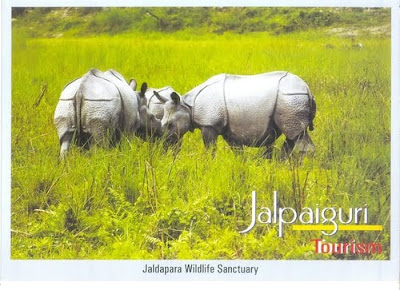Saturday, April 10, 2010
Culture
Thegeographical boundaries that constitute the Jalpaiguri district of the presentday had been under the control (administration) or rule of various dynasties oreven countries either in fragments or as a whole during the different phases ofhistory.
Ashistory goes by, when Huien Tsang visited Assam, a major portion of today'sJalpaiguri was a part of the kingdom of Kamrupa which then apparently extendedup to river Karatoya in the west. This land, often and commonly designated asDuars had often been included in the kingdoms of Bhutan and Cooch Behar. Thename 'Duars' may have evolved from the word 'Doors' or passages. There wereeighteen such passages which were used by the Bhutanese people to communicatewith the riverine plains of the south for the cause of trade or barters. In1864 under the command of captain Hedayet Ali, the British managed to capturethis area from the clutches of the Bhutanese kingdom and divided it into twoparts. The eastern part are merged with the Gowalpara district of today's Assamand the western part was named as a new district - Western Duars. In 1869through some constitutional changes the Jalpaiguri District was formed. Thename Jalpaiguri may have evolved from "JE-LE-PE-GO-RI" probablymeaning the place to exchange or barter warm clothes, Blankets etc. with otheressential commodities.
Fromtime immemorial this land remaimed a pristine creation. Covered with denseforest and riverine grassland, Jalpaiguri was the harbour of one of the richestbounties of Wild Life.
Ithad seen the arrival of various Indo-Mongoloid tribes, who came in to settle inthis fertile land. Most of them continue to live on even today. The majority ofthe Indo-Mongoloid class are the 'Raj Bangshis'. Apart from them there are theMech, the Ravas, the Totos etc.Some Limbus and Lepchas had also (migrated)immigrated through the terai crossing Mechi River. Then, came the British, andwith them the Bengalees from present Bangladesh. Many forest areas got clearedfor Tea Plantation and Agricultural lands. The planters brought from theChotonagpur Plateau area - the Nageshias, the Uraons and the Mundas to work aslabour in the Tea Gardens. All these various tribes brought along with them,their culture and beliefs.
Tourism
Jalpaiguri - this narrow stretch of land lying between the Sikkim - Darjeeling Himalayas and Gangetic West Bengal has more than often evoked a sense of both eerie and romanticism in many a heart since the early British Rule. Veined by mighty rivers like the Teesta,Torsa, Jaldhaka, Dyna, Neora, Sankosh etc. this piece of land has been aptly named as the land of 'Tea, Timber & Tourism'. A major stretch of area is bordered in the north by Bhutan and hence the name - DOOARS/DUARS which mean - Door of Bhutan.
Rarely one can find a place like Jalpaiguri that is so potentially rich in tourism. But a major part of it still remains to be exploited. Turbulent rivers battling out of the steep gorges, the vast stretches of forest cover, the undulating span of Tea Estates and the panoramic grandeur of the Himalayas are only a few jewels that made the British ground their roots deep into the heart of this land. Just drive around or take a hike, never will your eyes feel to rest. If a tourist is a nature lover or an admirer of Wild Life there cannot be a better place than this for him. He can run wild in the various Sanctuaries, National Parks & Tiger Reserves that are on offer. Garumara N.P., Jaldapara W.L.S. etc. are only a few. One can leissure out his time by the sides of the turbulent rivers or simply roll through the Tea Gardens. The more adventureres ones may prefer to trek to Rupang Valley & Buxa-Duar in Buxa Tiger Reserve. Apart from these, there are very old temples like the Jalpeshwar and Jatileshwar. Persons seeking to smell history can take a look at the Prisoners call at the Buxa Fort area where fighters were imprisoned during the pre indepence era.
Places like Jainti, Murti, Santale Khola, Mongpong will get any tourists imagination run wild. Moreover this place gives any one the oppurtunity to access the Darjeeling and Sikkim Himalayas whose potential in this regard need not be mentioned.
Subscribe to:
Comments (Atom)


